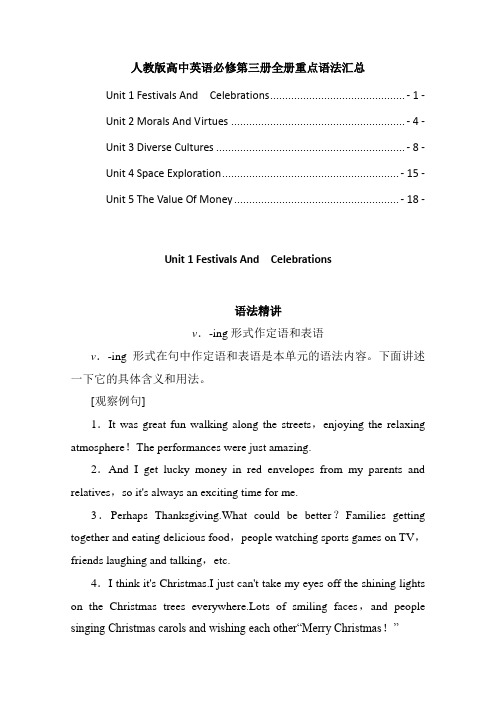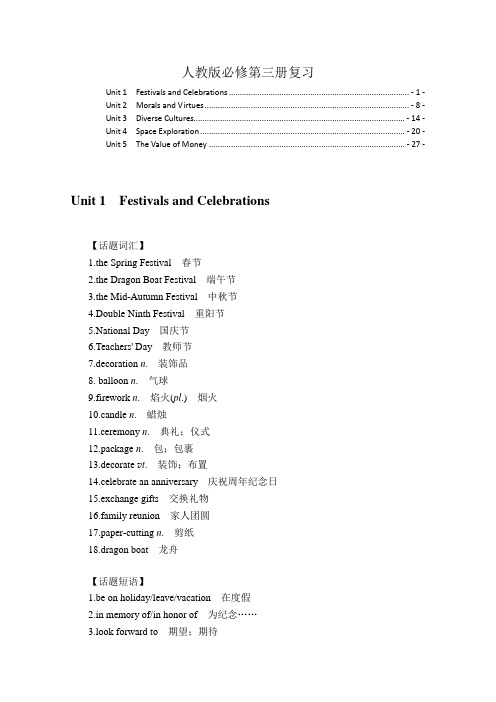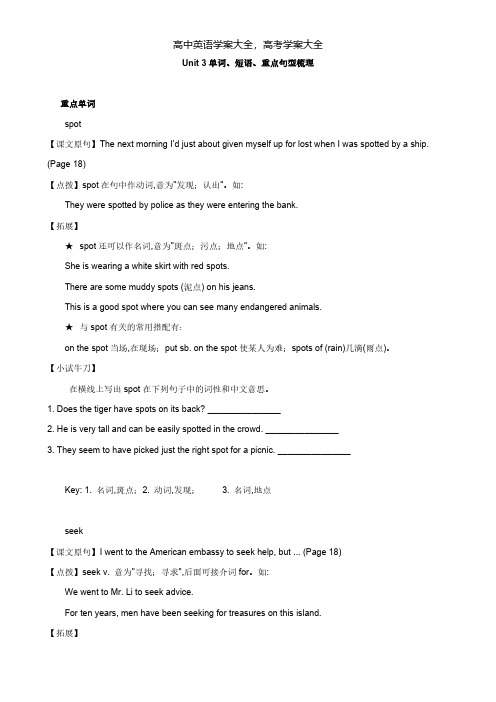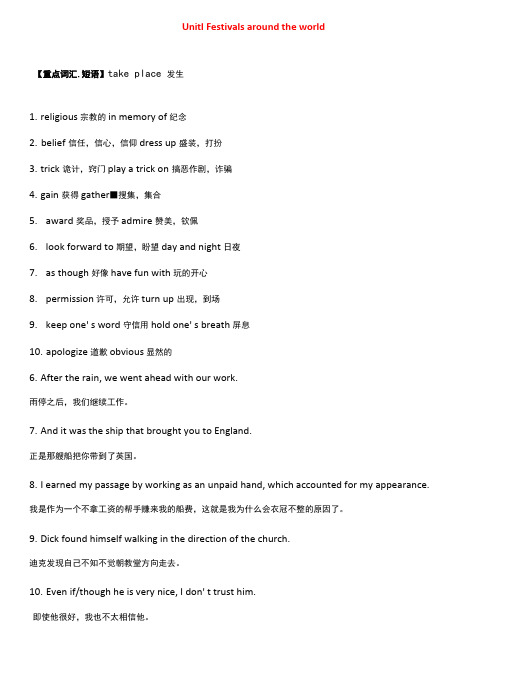人教版高中英语必修3重点词汇、短语、句型、语法大全
新教材 人教版高中英语必修第三册全册各单元重点语法汇总

人教版高中英语必修第三册全册重点语法汇总Unit 1 Festivals And Celebrations ............................................. - 1 - Unit 2 Morals And Virtues .......................................................... - 4 - Unit 3 Diverse Cultures ............................................................... - 8 - Unit 4 Space Exploration ........................................................... - 15 - Unit 5 The Value Of Money ....................................................... - 18 -Unit 1 Festivals And Celebrations语法精讲v.-ing形式作定语和表语v.-ing形式在句中作定语和表语是本单元的语法内容。
下面讲述一下它的具体含义和用法。
[观察例句]1.It was great fun walking along the streets,enjoying the relaxing atmosphere!The performances were just amazing.2.And I get lucky money in red envelopes from my parents and relatives,so it's always an exciting time for me.3.Perhaps Thanksgiving.What could be better?Families getting together and eating delicious food,people watching sports games on TV,friends laughing and talking,etc.4.I think it's Christmas.I just can't take my eyes off the shining lights on the Christmas trees everywhere.Lots of smiling faces,and people singing Christmas carols and wishing each other“Merry Christmas!”[归纳用法]一、v.-ing形式作定语1.单个动词的-ing形式作定语位于被修饰名词的前面,既可以表示被修饰者的作用或功能,也可以表示被修饰者的动作或状态。
人教版高中必修三英语知识点

人教版高中必修三英语知识点一、词汇1. 倍数与倍数短语:multiply, double, triple, quadruple, multiple of, times2. 数词:cardinal numbers, ordinal numbers, fractions, decimals3. 时态与语态:present simple, present continuous, present perfect, past simple, past continuous, past perfect, future simple, future continuous, future perfect, active voice, passive voice4. 动词词性与词组:verb, noun, adjective, adverb, phrasal verb5. 词形变化:base form, past form, past participle form, present participle form, comparative form, superlative form, adverb form6. 词义辨析:synonym, antonym, homonym, homophone7. 词汇记忆技巧:word association, visual aids, mnemonic devices二、语法1. 句子成分与句型:subject, predicate, object, complement, adverbial, simple sentence, compound sentence, complex sentence, conditional sentence, passive sentence2. 名词与代词:countable noun, uncountable noun, proper noun, common noun, collective noun, abstract noun, pronoun, personal pronoun, possessive pronoun, reflexive pronoun, demonstrative pronoun, interrogative pronoun, relative pronoun, indefinite pronoun3. 介词与介词短语:preposition, prepositional phrase, place prepositions, time prepositions, direction prepositions4. 冠词与冠词短语:definite article, indefinite article, zero article, articles at the beginning of a noun phrase5. 形容词与副词:descriptive adjective, limiting adjective, comparative form, superlative form, adverb, adverb of manner, adverb of frequency6. 动词与动词短语:transitive verb, intransitive verb, linking verb, modal verb, auxiliary verb, phrasal verb, verb patterns7. 形容词与副词的比较:comparative, superlative8. 语态与倒装:active voice, passive voice, inverted word order9. 时态与语态:present simple, present continuous, present perfect, past simple, past continuous, past perfect, future simple, future continuous, future perfect, passive voice三、阅读1. 主旨与细节:2. 推理与推断:3. 篇章结构与逻辑关系:4. 阅读技巧:a. scanningb. skimmingc. predictingd. guessing meaning from contexte. note-taking四、写作1. 书信写作:a. informal letterb. formal letterc. email2. 句子连接:a. andb. butc. sod. howevere. moreoverf. furthermore3. 写作技巧:a. brainstormingb. outliningc. paragraphingd. coherence and cohesione. proofreading and editing以上是人教版高中必修三英语的知识点总结,希望对你的学习有所帮助。
新教材人教版高中英语必修第三册全册书重点单词短语句型汇总(2022新高考一轮复习资料)

人教版必修第三册复习Unit 1Festivals and Celebrations .................................................................................. - 1 - Unit 2Morals and Virtues ............................................................................................. - 8 - Unit 3Diverse Cultures................................................................................................ - 14 - Unit 4Space Exploration ............................................................................................. - 20 - Unit 5The Value of Money ......................................................................................... - 27 -Unit 1Festivals and Celebrations【话题词汇】1.the Spring Festival 春节2.the Dragon Boat Festival 端午节3.the Mid-Autumn Festival 中秋节4.Double Ninth Festival 重阳节5.National Day 国庆节6.Teachers' Day 教师节7.decoration n. 装饰品8. balloon n. 气球9.firework n. 焰火(pl.) 烟火10.candle n. 蜡烛11.ceremony n. 典礼;仪式12.package n. 包;包裹13.decorate v t. 装饰;布置14.celebrate an anniversary 庆祝周年纪念日15.exchange gifts 交换礼物16.family reunion 家人团圆17.paper-cutting n. 剪纸18.dragon boat 龙舟【话题短语】1.be on holiday/leave/vacation 在度假2.in memory of/in honor of 为纪念……3.look forward to 期望;期待4.dress up 打扮;装扮5.turn up 出现;到场6.celebrate the festival 庆祝节日7.have fun with 玩得开心8.of good/poor quality 质量好/坏9.a display of fireworks 烟火表演10.hold one's breath 屏息;屏气【话题佳句】1.What we love most is the time when the whole family enjoy the full moon together.我们最喜爱的是一家人一起赏满月的时刻。
高中英语人教必修三unit3单词,短语,重点句型梳理

Unit 3单词、短语、重点句型梳理重点单词spot【课文原句】The next morning I’d just about given myself up for lost when I was spotted by a ship. (Page 18)【点拨】spot在句中作动词,意为"发现;认出"。
如:They were spotted by police as they were entering the bank.【拓展】★spot还可以作名词,意为"斑点;污点;地点"。
如:She is wearing a white skirt with red spots.There are some muddy spots (泥点) on his jeans.This is a good spot where you can see many endangered animals.★与spot有关的常用搭配有:on the spot当场,在现场;put sb. on the spot使某人为难;spots of (rain)几滴(雨点)。
【小试牛刀】在横线上写出spot在下列句子中的词性和中文意思。
1. Does the tiger have spots on its back? _______________2. He is very tall and can be easily spotted in the crowd. _______________3. They seem to have picked just the right spot for a picnic. _______________Key: 1. 名词,斑点;2. 动词,发现; 3. 名词,地点seek【课文原句】I went to the American embassy to seek help, but ... (Page 18)【点拨】seek v. 意为"寻找;寻求",后面可接介词for。
人教版高中英语(必修3)重点词汇、短语、句型、语法全汇总

人教版高中英语(必修3)重点词汇、短语、句型、语法全汇总Unit1 Festivals around the world重点词汇1.take place 发生2.religious 宗教的3.in memory of 纪念4.belief 信任,信心,信仰5.dress up 盛装,打扮6.trick 诡计,窍门7.play a trick on 搞恶作剧,诈骗8.gain 获得9.gather 搜集,集合10.award 奖品,授予11.admire 赞美,钦佩12.look forward to 期望,盼望13.day and night 日夜14.as though 好像15.have fun with 玩的开心16.permission 许可,允许17.turn up 出现,到场18.keep one's word 守信用19.hold one's breath 屏息20.apologize道歉21.obvious 显然的22.set off 出发,动身,使爆炸重点短语1.mean doing sth. 意味着mean to do sth. 打算或企图做某事mean sb. to do sth. 打算让某人做某事be meant for 打算作……用; 为…而有2.take place 发生;举行3.of all kinds 各种各样的4.starve to death 饿死be starved of 缺乏starve for sth, starve to do 渴望5.plenty of 大量; 充足6.be satisfied with对......感到满意to one's satisfaction令某人感到满意7.do harm to sb.=do sb. harm 伤害某人8.in the shape of 呈…的形状,以…的形式9.in memory of/ to the memory of sb.纪念某人10.dress up 穿上最好的衣服;打扮,化装11.award sth.(to sb.)和award sb.sth.(for sth.) 颁奖reward sb. for sth. 因…奖赏某人reward sb. with sth. 用某物酬劳某人12.admire sb. for sth在某方面钦佩某人13.look forward to期望,期待,盼望14.have fun with(与某人)玩得开心;过得快乐( have a good time;enjoy oneself.)15. turn up 出现;调大/高turn down 拒绝;调小/低turn off 关掉turn on 打开turn out 结果是......turn to sb. for help 向某人求助16.keep one's word 守信用break one's word, 失信17.It be obvious that-clause显而易见;一目了然18.set off 出发; 使(地雷、炸弹)爆炸set in 开始set up 建立,创立set out to do = set about doing sth. 着手做set down 写下,记下19.remind sb. of sth. 提醒,使想起重点句型1.Please make sure when and where the accident took place.请查清楚事故是何时何地发生的。
人教版高中英语必修3重点词汇、短语、句型、语法大全

Unitl Festivals around the world【重点词汇.短语】take place 发生1.religious 宗教的in memory of 纪念2.belief信任,信心,信仰dress up盛装,打扮3.trick诡计,窍门play a trick on搞恶作剧,诈骗4.gain获得gather■搜集,集合5.award奖品,授予admire赞美,钦佩6.look forward to 期望,盼望day and night 日夜7.as though 好像have fun with 玩的开心8.permission 许可,允许turn up出现,到场9.keep one' s word 守信用hold one' s breath 屏息10.apologize 道歉obvious 显然的6.After the rain, we went ahead with our work.雨停之后,我们继续工作。
7.And it was the ship that brought you to England.正是那艘船把你带到了英国。
8.I earned my passage by working as an unpaid hand, which accounted for my appearance. 我是作为一个不拿工资的帮手赚来我的船费,这就是我为什么会衣冠不整的原因了。
9.Dick found himself walking in the direction of the church.迪克发现自己不知不觉朝教堂方向走去。
10.Even if/though he is very nice, I don' t trust him.即使他很好,我也不太相信他。
【语法总结】名词性从句在句子中起名词作用的句子叫名词性从句(Noun Clauses),名词性从句的功能相当于名词词组,它在复合句中能担任主语、宾语、表语、同位语等,因此根据它在句中不同的语法功能,名词性从句又可分别称为主语从句、宾语从句、表语从句和同位语从句。
人教 必修三 重点单词短语及句型的归纳
高中英语必修Ⅲ重点单词、短语和句型Unit 1 Festivals around the world重点单词和短语1. celebrate v. 庆祝(仪式、庆典等),祝贺;(以文章、演说等)颂扬,赞美,歌颂【拓展】celebration n. 庆祝,祝贺in celebration of 为了庆祝2. take place【链接】take the first place获得第一名take one’s place就座;代替某人take the place of 代替(动词短语)in place of = instead of代替(介词短语)3. starve vt. & vt.(使)饿死;饿得要死starve to death/be starved to death 饿死starve to do sth. 渴望去做某事starve for=be starved for/of 渴望获得,迫切需要;缺乏be starving 饿极了starve sb. into (doing) sth. 断绝食物(或资金)来源以迫使某人做某事4. be+性质形容词(如easy, hard, difficult, important等)+动词不定式(主动形式表示被动意义)The problem is hard to solve. 这个问题很难解决。
The work is impossible to finish next month. 这项工作不可能在下个月完成。
The car isn’t safe to drive. 这两车开起来不安全。
【注意】①在这种句式中,动词不定式并不强调主语跟它的被动关系,而是表明形容词是其动作的结果。
②此外,为了理解方便,可以在动词不定式前加上一个逻辑主语for sb.。
如:The question is easy for me to answer.③如果动词不定式的动词是不及物动词,要在动词后加上适当的介词。
新教材人教版高中英语选择性必修第三册全册重点单词短语句型汇总(28页)含答案
人教版选择性必修第三册全册重点单词短语句型汇总Unit 1 Art (1)Unit 2 Healthy Lifestyle (10)Unit 3 Environmental Protection (19)Unit 4 Adversity And Courage (27)Unit 5 Poems (35)Unit 1 ArtWords and Phrases1[教材原句P2]In particular,his paintings are set apart from other paintings by their realistic human faces and deep emotional impact.尤其是他的绘画作品,更是以其逼真的人物面貌和深刻的情感冲击而从其他绘画作品中脱颖而出。
(1)in particular尤其;特别[例1] Why should he notice her car in particular?他为什么会特别注意到她的车?[例2] He loves science fiction in particular.他特别喜欢科幻小说。
[造句] 他的发言是泛指一般情况,不是针对某一个人的。
His statement refers to people in general,not to anyone in particular.[知识拓展]in particular=particularly 特别;尤其be particular about 对……挑剔;对……讲究be particular to... 为……所特有(2)set apart from使与众不同;使突出;使优于……[例1] Her clear and elegant writing sets her apart from other journalists.她的文章清丽典雅,比其他记者高出一筹。
[例2] His strong views about life set him apart from most other Americans.他有关生活的强烈观点,使他有别于大多数其他美国人。
人教版高中英语必修三1-5单元重点词汇和语法(完整版)
第一单元1. take place 发生take away 拿走、带走;使离开、使消失take back 送回,收回take down 拿下,记下,取下take off 脱下;起飞take up 开始花时间做 , ,开始对 , 感兴趣2.in memory of 纪念;追念3.dress up 盛装,打扮;装饰4.trick n 诡计;恶作剧Vt. 欺骗;诈骗play a trick on 搞恶作剧5.lead (, ) to 领往;通往;导致You see the path on your right ?It leads to the village. 看见右边的小路了吗?它通向村子。
6.in the shape of 呈现某种形状,以某种形式呈现出来7.look forward to 盼望,后面接名词、代词或动词-ing 形式I am looking forward to his being back. 我盼望他回来。
8.as though 好像;仿佛 , 似的与 as if 同义He acts as though he didn ’ t know anything about it. 他表现得好像对这件事一无所知.9.have fun with 玩得开心10.keep/lose one ’s word 守信 / 失信11.turn up 到场;出现;(声音等)调大turn on 开turn off 关turn down (声音等)调小turn over 移交turn to 开始对 , 感兴趣12.hold one ’ s breath 屏住呼吸13.set off 出发;点燃set about 开始着手set down 使坐下;放下;写下;抄下;制定(规划、原则等)set out 出发,启程,布置,安排,陈述,说明set up 竖立;建造,装配;提出(建议等)14.remind 提醒;使想起remind sb of sth 让某人想起某事第二单元1. Wang Peng sat in his empty restaurant feeling very frustrated.王鹏坐在他空空的餐馆里很沮丧feeling very frustrated . 现在分词在句中作伴随状语eg.She sat on the chair reading a newspaper.( 表伴随 )Walking in the street, she met her old friend.( 表时间 )Seeing no body at home , she decided to eat outside.( 表原因 )The child fell, striking his head against the ground.( 表结果 )2. By now his restaurant ought to be full of people. 到了这个时候他的餐馆本该宾客盈门的。
人教版高中英语必修三重点单词、短语、语法总结
必修三各单元重点单词、短语、语法总结第一单元1)starve作不及物动词,表示“饿死,挨饿”。
starve for=be starve of/for,表示“渴望获得,迫切得到”。
2)plenty作不可数名词,只用于肯定句中,表示“充足,大量,富裕”,可做主语,宾语或表语。
做主语时,谓语动词随着plenty所指的单复数形式作相应的变化。
plenty也可作副词,表示“充分地,十足地,好多”。
in plenty表示“大量的,丰富,充裕”可作表语,定语,状语。
3)satisfy作及物动词,表示“满意,使满足”,直接跟宾语,若接that从句时,意思是“使相信”,从句前有间接宾语。
satisfy…with以……满足be satisfied with对……满足satisfy…for向……偿还be satisfied to do sth满足于做某事4)harm作名词,意为“损害”,不与不定冠词连用,常与do,come,mean等动词搭配。
do more harm than good弊大于利There’s no harm in(sb’s)doing sth=It does no harm for sb to do sth 做某事无害处作及物动词,表示“损害,伤害”。
5)lead作及物动词,表示“领导,引导”其宾语常接介词短语或者副词作宾补。
表示“影响,致使”时,后接介词to,也可以接不定式。
lead sb into使某人陷入某种不良的状态。
lead sb away使盲从,常用于被动语态。
lead nowhere毫无结果,,对……不起作用。
lead up to sth作为……准备,导致。
lead sb by the nose牵着某人的鼻子,完全操纵某人lead a dog’s life过困难的生活lead sb believe that使某人相信(假的事情或不确切的事情)lead the way带路,带头lead作为名词,give sb a lead给某人做出榜样,提示某人6)origin是名词,表示“起源,起因,出身”。
- 1、下载文档前请自行甄别文档内容的完整性,平台不提供额外的编辑、内容补充、找答案等附加服务。
- 2、"仅部分预览"的文档,不可在线预览部分如存在完整性等问题,可反馈申请退款(可完整预览的文档不适用该条件!)。
- 3、如文档侵犯您的权益,请联系客服反馈,我们会尽快为您处理(人工客服工作时间:9:00-18:30)。
人教版高中英语必修3重点词汇、短语、句型、语法大全Unit1 Festivals around the world【重点词汇、短语】1.take place 发生2.religious 宗教的3.in memory of 纪念4.belief 信任,信心,信仰5.dress up 盛装,打扮6.trick 诡计,窍门7.play a trick on 搞恶作剧,诈骗8.gain 获得9.gather 搜集,集合10.award 奖品,授予11.admire 赞美,钦佩12.look forward to 期望,盼望13.day and night 日夜14.as though 好像15.have fun with 玩的开心16.permission 许可,允许17.turn up 出现,到场18.keep one’s word 守信用19.hold one’s breath 屏息20.apologize道歉21.obvious 显然的22.set off 出发,动身,使爆炸【重点句型】1.Please make sure when and where the accident took place.请查清楚事故是何时何地发生的。
2.Some festival are held to honour the dead, or satisfy and please the ancestors,who could return either to help or to do harm.还有一些节日,是为了纪念死者、满足或取悦祖先,因为(祖先们)有可能回到世上帮助他们,也有可能带来危害。
3.In Japan the festival is called Obon,when people should go to clean the graves and light incense in memory of their ancestors.(非限制性定语从句)在日本,这个节叫孟兰盆节,在这个节日里,人们要上坟、扫墓、烧香,以缅怀祖先。
4.They dress up and try to frighten people.他们乔装打扮去吓唬别人。
5. If they are not given anything, the children might play a trick.如果你什么也不打发给孩子,他们可能会捉弄别人。
6. In India there is a national festival on October 2 to honour Mahatma Gandhi, the leader who helped gain India's independence from Britain.在印度,10月2日是纪念马哈特马.甘地的全国性节日,他是帮助印度脱离英国而独立的领袖。
7. The most energetic and important festivals are the ones that look forward to the end of winter and to the coming of spring.最富生气而又最重要的节日,就是告别冬天、迎来春天的日子。
8. The country is covered with cherry tree flowers so that it looks as though it might be covered with pink snow.整个国度处处都是樱花盛开,看上去就像罩上了一层粉红色的雪。
【语法总结】情态动词定义:情态动词是一种本身有一定的词义、但要与动词原形及其被动语态一起使用,给谓语动词增添情态色彩,表示说话人对有关行为或事物的态度和看法,认为其可能、应该或必要等。
情态动词数量不多,主要有下列:can (could), may (might), must, need, ought to, dare (dared), shall (should), will (would),have (to) ,had better.一. can和could的用法1. 表示能力或客观可能性,还可以表示请求和允许。
注意:①could也可表示请求,语气委婉,主要用于疑问句,不可用于肯定句,答语应用can。
②can表示能力时,还可用be able to代替。
2. 表示惊异、怀疑、不相信的态度。
(主要用在否定句、疑问句或惊叹句中)3. “can(could) + have + 过去分词”的疑问或否定形式表示对过去发生的行为怀疑或不肯定。
4. 用在疑问句及否定句中,表示惊讶,不相信等。
5. cannot…too...表示“无论怎样……也不过分”二. may和might的用法1. 表示许可。
表示请求、允许时,might比may的语气更委婉一些,否定回答时(口语中常用) no , you can’t. or , yes, please 用mustn’t表示“不可以”、“禁止”、“阻止”之意(具有强烈禁止的意思)。
用May I…征询对方许可在文体上比较正式,在口气上比较客气。
在日常口语中,用Can I ... 征询对方意见在现代口语中更为常见。
2. 用于祈使句中表示祝愿。
3. 表示推测、可能(疑问句不能用于此意)。
4. “may(might) + have + 过去分词”表示对过去发生的行为的推测。
三. must和have to的用法1. 表示必须、必要。
(must表示主观多一些而have to则表示客观多一些)回答must引出的问句时,如果是否定的回答,不能用mustn’t,而要用needn’t 或don’t have to。
2.“must be + 表语”的结构表示推测,它的否定或疑问式用can代替must。
3. “must + have + 过去分词”的结构常用在肯定句中,表示对过去发生的行为的推测。
它的否定或疑问式用can代替must。
4. have to的含义与must相似,两者往往可以互换使用,但have to有各种形式,随have的变化而定。
注意:have to也可拼做have got to。
四. dare和need的用法1. need表示“需要”,作情态动词时,仅用于否定句或疑问句中,在肯定句中一般用must, have to, ought to,或should代替。
注意:needn't + 不定式的完成式“表示本来不必做某事而实际上做了某事”2. dare作情态动词时,主要用于疑问句、否定句和条件状语从句中,一般不用在肯定句中。
3. dare和need常用作实义动词,有时态、人称和数的变化,所不同的是,作实义动词时,在肯定句中,dare后面通常接带to的不定式,在否定和疑问句中,dare 后面可接带to或不带to的不定式。
五. shall和should的用法1. shall的用法:①shall用于第一人称,表示征求对方的意愿。
②shall用于第一、第三人称疑问句中,表示说话人征求对方的意见或向对方请示。
③shall用于第二、第三人称,表示说话人给对方命令、警告、允诺或威胁。
2. should的用法:①should表示劝告、建议、命令,其同义词是ought to;在疑问句中,通常用should 代替ought to。
②Why(or How) + should结构表示说话人对某事不能理解,感到意外、惊异等意思。
意为“竟会”。
③“should + have + 过去分词”结构一般表示义务,表示应该做到而实际上没有做到,并包含一种埋怨、责备的口气。
六. will和would的用法1. 表示请求、建议等,would比will委婉客气。
2. 表示意志、愿望和决心。
3. 用“will be”和“will(would) + have + 过去分词”的结构表示推测,主要用于第二、三人称。
前者表示对目前情况的推测,后者表示对已经完成的动作或事态的推测。
4. would可表示过去反复发生的动作或某种倾向。
5. 表料想或猜想。
七. ought to的用法1. ought to表示应该。
2. 表示推测。
注意与must表示推测时的区别:He must be at home by now. (断定他已到家)He ought to be home by now. (不十分肯定)This is where the oil must be. (比较直率)This is where the oil ought to be. (比较含蓄)3. “ought to + have + 过去分词”表示过去应做某事而实际未做。
ought和should的区别:1.ought语气略强。
2.should较常用。
3.ought在美国英语中用的很少,而should却相当常用。
4.ought属正式用语。
八. used to,had better,would rather的用法1. used to表示过去的习惯动作或状态,现在已不存在,在间接引语中,其形式可不变。
如:He told us he used to play football when he was young.2. had better意为“最好”,后接不带to的不定式。
3. would rather意为“宁愿”,表选择,后接不带to的不定式。
Unit2 Healthy eating【重点词汇、短语】1.diet 日常饮食,节食2.balance 平衡,天平3.fry 油炸4.ought to 应该5.lose weigh 减肥6.raw 生的,未加工的7.get away with 被放过,(做坏事)不受惩罚8.tell a lie 说谎9.win…back 赢回10.strength强项,长处,力量11.consult 咨询,请教12.earn one’s living 谋生13.debt 债14.in debt 欠债15.limit 限制,界限16.benefit 利益bine 联合,结合18.cut down 削减,删节19.before long 不久以后20.put on weight 增加体重【重点句型】1. The food you eat helps you grow in different ways.你吃的食物能以不同的方式帮你成长。
2.Standing on top of the tall building,we could see the whole city.站在高楼的顶部,我们能看到整个城市。
3. Which food contains more sugar?哪一种食物含有更多的糖?4. What could have happened?可能发生了什么事?5. Something terrible must have happened if Maochang was not coming to eat with him as he always did.要是茂昌不像往常那样和他一起吃饭,那问题一定严重了。
